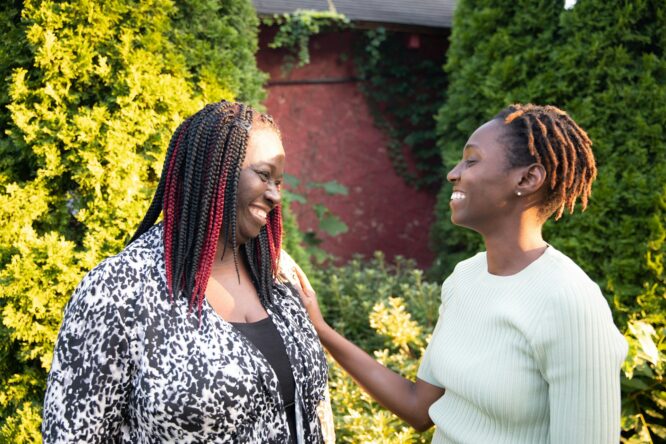For some people, goodbyes are no big deal.

They wave, smile, maybe hug, and move on without too much emotional fuss. However, for others, even the smallest farewell can feel weighty. Whether it’s the end of a relationship, a job, a holiday, or just a dinner with friends, parting ways leaves them unsettled. It’s not always about the moment itself; it’s about everything the goodbye represents.
People who struggle with goodbyes often carry a deeper emotional load. They might be overly nostalgic, afraid of change, or just deeply sentimental. Whatever the reason, their discomfort tends to show in the way they act before, during, and even after a goodbye. If you’ve ever had to say goodbye ten different times before actually leaving, you’ll probably recognise a few of these behaviours.
1. They drag out the farewell longer than necessary.

Saying goodbye once is hard enough, but for these people, it turns into a drawn-out affair. They linger in doorways, restart conversations, or keep popping back for “one more thing.” They’re not purposely being dramatic, they just don’t want the moment to end, even if it’s just a casual parting.
That habit often comes from not knowing how to emotionally transition. If something has meant a lot to them, they struggle to step away without squeezing every last drop of connection from it. They might not realise how long they’re taking—it just feels too soon to walk away.
2. They avoid goodbyes altogether.

On the flip side, some people deal with the discomfort by skipping the goodbye completely. They’ll ghost a situation, leave quietly, or make a vague exit like “I’ll see you around,” even if they know they won’t. It’s easier than facing the emotion head-on.
Their avoidance often comes from a fear of being overwhelmed or not knowing what to say. If they don’t say goodbye, maybe they don’t have to feel the ending quite so deeply. It’s not coldness—it’s self-protection in disguise.
3. They turn it into a joke.

Humour is a powerful coping mechanism, and for people who hate goodbyes, it’s often their go-to. They might crack a joke, make light of the situation, or playfully downplay the farewell to avoid getting too emotional.
It’s not that they don’t care; it’s that caring feels a little too raw. By making it funny, they’re creating distance between themselves and the reality of the moment. It’s their way of managing vulnerability without showing it outright.
4. They downplay how much something meant to them.

Instead of saying, “This was really important to me,” they’ll say things like, “It wasn’t a big deal” or “I didn’t think I’d be here that long anyway.” It’s easier to pretend it didn’t matter than to admit they’re having a hard time letting go.
For some, acknowledging the emotional weight of a goodbye feels too exposing. If they act like it wasn’t that meaningful, maybe it’ll hurt less. However, underneath that nonchalance is often a deep reluctance to deal with the sadness of parting.
5. They get unusually quiet when it’s time to part.

You’ll notice it in their body language—the sudden silence, the way they look at their phone or fix their bag while everyone else is wrapping up. They’re not angry or disinterested; they’re just in their feelings and unsure how to express them.
This kind of quiet is often their way of holding it together. Speaking might crack the emotion open, and they’re not sure they can handle that. So they go inward instead, hoping no one notices they’re struggling to say goodbye.
6. They replay the goodbye in their head afterwards.

Once the moment has passed, they don’t just move on. They overthink what they said, wonder if they should’ve said more, or worry about how it came across. A simple hug goodbye can spiral into a full emotional debrief in their head hours later.
Goodbyes don’t end for them when the doors close. They carry the moment with them, reprocessing it again and again. Again, they’re not being dramatic; it’s just that endings stick to them in a way they can’t easily shake off.
7. They look for ways to stay connected after it’s “over.”

If it’s the end of something more significant—like a job, a relationship, or a holiday—they’ll often find subtle ways to stay tethered. A message here, a shared memory there, or even just revisiting photos on their phone becomes a way to soften the loss.
They’re not trying to avoid reality, but they are trying to hold onto something meaningful. Letting go feels like erasing something they valued. These small connections give them comfort during the adjustment period.
8. They get irritable or distant in the lead-up to a goodbye.

For some, the emotions around goodbye don’t show up as sadness; they show up as tension or shortness. They might seem snappy, distracted, or distant in the hours or days leading up to a farewell without being able to say why.
It’s often a form of emotional pre-protection. If they create a little distance now, maybe the goodbye won’t feel as sharp. It’s an unconscious way of bracing for impact, even if it confuses the people around them.
9. They over-explain why they’re leaving.

Whether it’s the end of a party or a bigger life change, they feel the need to justify their exit in detail. “I have work early,” “It’s getting late,” “I didn’t sleep well”—they want you to know it’s not personal, even if you never thought it was.
This usually comes from a desire to be understood. The goodbye feels awkward, so they fill the silence with explanations. Underneath that is often a worry that their departure might be misunderstood or leave someone else feeling rejected.
10. They write long goodbye messages when they can’t say it in person.

If they can’t face a direct goodbye, they’ll often turn to writing. Whether it’s a text, email, or heartfelt letter, this is their way of processing everything they couldn’t say out loud. For them, words come easier when they don’t have to navigate the emotion face-to-face.
These written goodbyes are usually thoughtful, expressive, and more emotionally open than anything they could’ve managed in real time. It’s not avoidance; it’s the only way they know how to honour the goodbye without being overwhelmed.
11. They find it hard to let go of places, not just people.

Leaving a home, a favourite coffee shop, or a city they loved can feel just as difficult as saying goodbye to a person. They get attached to the energy of a space, the memories it holds, and the version of themselves that lived there.
This makes transitions feel heavier. Even packing up a holiday rental can bring on unexpected emotion. It’s not just what they’re leaving; it’s what it represented. These people often carry physical reminders long after they’ve moved on.
12. They struggle with closure, even when the goodbye was mutual.

Even when parting makes sense, it doesn’t feel any easier. People who hate goodbyes tend to second-guess, wonder if they could’ve done more, or feel like something’s unresolved, no matter how clear the situation was.
Closure, for them, isn’t about a tidy ending. It’s about feeling at peace with the emotions around it, which can take longer than they expect. They might not say it, but the goodbye sits with them long after it’s been said.
13. They treat every goodbye like it might be the last.

Whether it’s a short trip or a major life change, they often approach goodbyes with intensity. The hug lasts a bit longer, the message is more heartfelt, and they linger in a way that suggests they don’t take moments for granted.
This comes from a deep awareness of impermanence. They’ve learned, in some way, that things can change quickly, and that goodbyes aren’t always predictable. So they treat each one like it matters, because to them, it really does.




